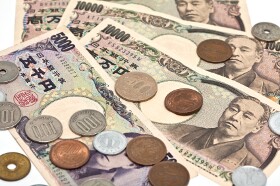The Japanese yen advanced against the US dollar on Wednesday after traders became anxious about recent political developments in the United States. The Japanese currency, which is viewed as a safe haven asset, ended two days of little movement as controversies surrounding US President Donald Trump were stoked by recent reports on his ties with Russia.
For the past 8 days, the Trump administration has been busy putting out the political fire that was ignited following Trumpâs sudden firing of Federal Bureau of Investigation Director James Comey last week. However, the fire was further stoked by reports that surfaced yesterday of a memo written by Comey that documented a meeting that he had with the president in the Oval Office last February.
In the memo, Comey wrote that Trump asked him to halt ongoing investigation into his former Security Adviser Michael Flynnâs conversations with Russiaâs US ambassador a single day after Flynn was ousted. The white house had previously claimed that Flynn, which some suspect to have been the link between Trump and Russia, delivered misleading information about the talks he had with the Russian ambassador.
Trump was already in a tricky position after handing out sensitive intelligence to Russian officials on Monday. The incident, which was initially denied by the president before he admitted and justified it by claiming that he was acting within his rights, raised concerns surrounding Trumpâs ties with Russia.
The controversy led the Senate Intelligence Committee to formally demand all memos that FBI Director James Comey has of his meeting with Trump. The committee also requested Acting FBI Director Andrew McCabe to turn in any notes prepared by Comey of his communications with White House seniors or Department of Justice officials. Comey will also appear before the committee to give his testimony.
Investorsâ appetite for risk drastically declined following these developments. The general mood between traders switched from anticipation for details on Trumpâs economic agenda to worries that the president might not stay in office long enough to bring his promises to reality.
In other news, Bank of Japan Governor Haruhiko Kuroda said earlier today that the central bank will continue its massive monetary easing as wage growth and inflation remain under the bankâs target. The gap between the tighter policy from the US Federal Reserve and Japanâs central bankâs stance does not appear to be concerning to Kuroda, who said that interest rate decisions in the United States do not resonate in Japan.
Japanâs Ministry of Economy, Trade, and Industry said in a fresh report that a reading of industrial production in March was revised to -1.9%, which was better than estimates. Traders now await the Japanese gross domestic product data, which is due to be released at 23:50 GMT today.
USD/JPY declined to 110.94 as of 18:20 GMT, the pairâs weakest level since April 25, from 112.57 when the day began.
If you have any questions, comments or opinions regarding the Japanese Yen,
feel free to post them using the commentary form below.



Be First to Comment